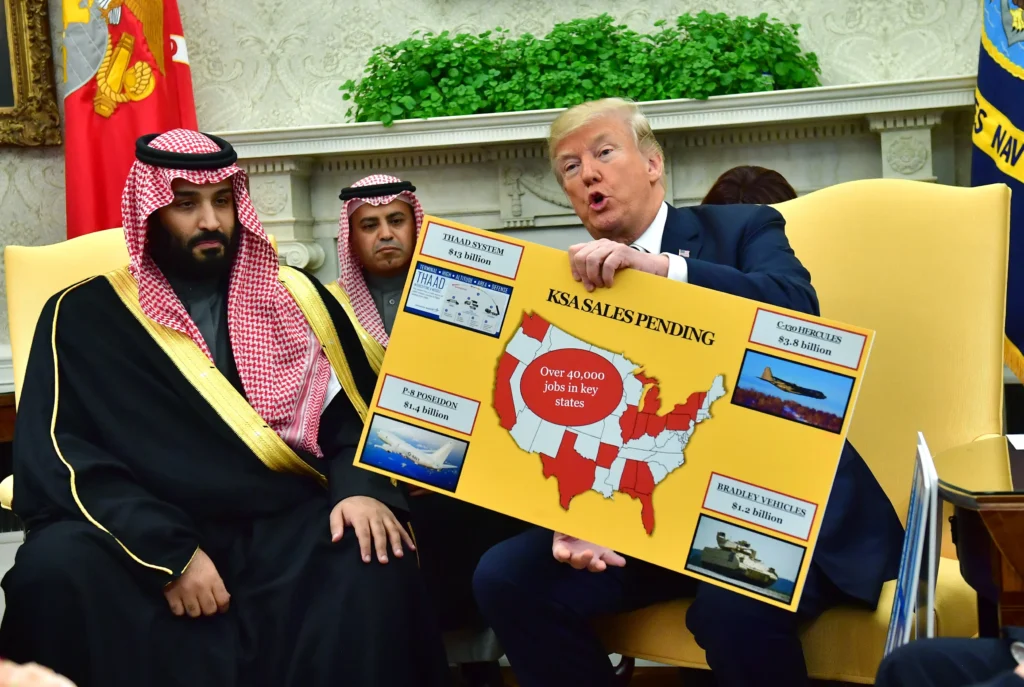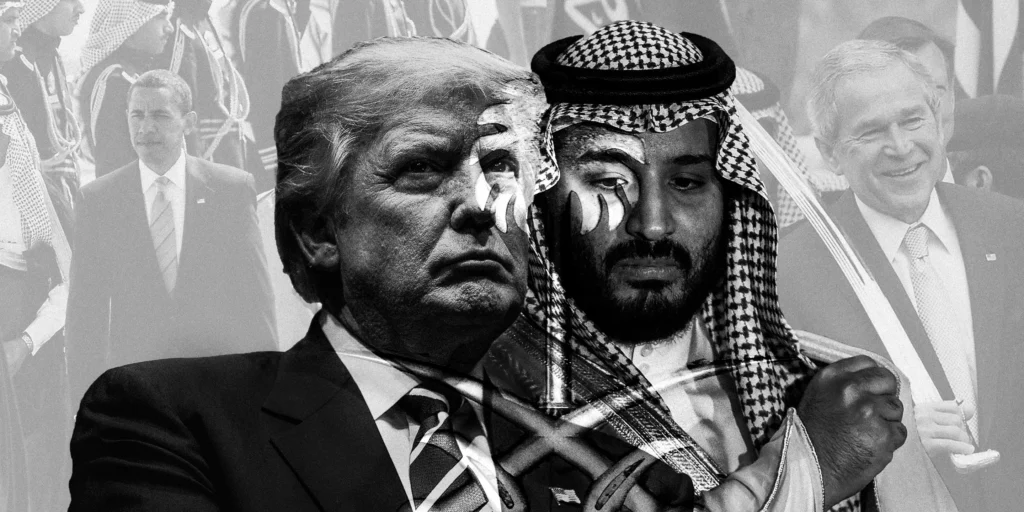Future President Donald Trump’s warm relationship with Saudi Arabia has drawn both praise and criticism over the years. From billion-dollar arms deals to personal business ties and public admiration for the kingdom’s leadership style, Trump’s connection with the Saudi monarchy has raised an important question: Does Trump, either consciously or subconsciously, want to model certain aspects of the United States after Saudi Arabia?
Though the two nations are fundamentally different in terms of governance and culture—America being a democratic republic and Saudi Arabia being an absolute monarchy—there are growing concerns that Trump’s affinity for the Saudi way of ruling may reflect deeper authoritarian ambitions. With Trump continuing to play a major role in American politics, especially as he eyes another presidential run, it’s worth examining what his Saudi admiration could mean for America’s future.
Trump’s Early Embrace of Saudi Arabia
Trump’s relationship with Saudi Arabia began even before he was elected president. During his campaign, he frequently spoke positively about the kingdom, particularly in the context of business. He often highlighted Saudi investments in the United States, especially in his own properties. This close financial relationship created speculation about whether these personal business interests would affect his decisions as president—and they may have.

One of Trump’s first major international trips as president in 2017 was to Saudi Arabia. He was given a lavish royal welcome, complete with golden swords, elaborate ceremonies, and praise from Crown Prince Mohammed bin Salman. The trip resulted in a widely publicized arms deal reportedly worth over $100 billion, with Trump later claiming the number would rise to over $300 billion. Whether or not all of these deals materialized is still debated, but the symbolism was clear: Trump valued the Saudi relationship deeply.
Overlooking Human Rights for Strategic Gains
Critics argue that Trump’s support for Saudi Arabia often came at the expense of American values, particularly human rights. Saudi Arabia has been widely criticized by international human rights organizations for its treatment of dissidents, women, and migrant workers. One of the most disturbing events during Trump’s presidency was the 2018 murder of journalist Jamal Khashoggi, a Saudi citizen and U.S. resident, inside the Saudi consulate in Istanbul.
Despite a CIA assessment that concluded with high confidence that Crown Prince Mohammed bin Salman ordered the killing, Trump refused to hold the crown prince directly accountable. Instead, he issued a statement defending the U.S.-Saudi alliance, emphasizing economic and military partnerships over justice or accountability. He was quoted saying, “Maybe he did and maybe he didn’t,” referring to the crown prince’s alleged involvement in Khashoggi’s murder.
This moment crystallized for many observers Trump’s prioritization of loyalty and deals over transparency and democratic principles. By siding with the Saudi government in the face of global condemnation, Trump signaled his comfort with authoritarian-style governance—as long as it served his strategic or economic interests.
A Personal Model of Power?
Saudi Arabia’s governance is centralized, hierarchical, and deeply rooted in loyalty to the royal family. There is no separation of powers as found in democracies, and dissent is often met with harsh punishment. While Trump never openly stated he wants to replicate this system in America, some of his political behavior mirrors aspects of this centralized power model.
During his presidency, Trump frequently attacked the independence of the media, calling critical outlets “the enemy of the people” and labeling unflattering reports as “fake news.” He publicly criticized judges who ruled against him and suggested that the Justice Department should go after his political opponents. These are not traits typically associated with a healthy democracy—they are hallmarks of authoritarianism.
His refusal to accept the outcome of the 2020 election, his efforts to overturn the results, and the violent January 6 Capitol riot all reflect a troubling disregard for democratic norms. While Saudi Arabia is not responsible for these events, the admiration Trump has shown for the crown prince and his tight control over governance seems to mirror the kind of absolute authority Trump has occasionally hinted at wanting.
The Business Connection
Another key aspect of Trump’s relationship with Saudi Arabia is financial. Long before his presidency, Saudi investors were among the major clients of Trump’s real estate business. In fact, Trump once said, “I make a lot of money with them. They buy all sorts of my stuff. They pay me millions and hundreds of millions.” Since leaving office, Trump has continued to benefit from Saudi-backed investments.
One of the most notable examples is the Saudi-backed LIV Golf league, which has hosted tournaments at Trump-owned golf courses. The former president and his family have also continued to engage in property development deals in regions like Dubai and potentially Jeddah. His son-in-law, Jared Kushner, received a $2 billion investment from the Saudi sovereign wealth fund shortly after leaving the White House—raising questions about pay-for-play politics and the blurred lines between public service and private profit.
These ongoing financial ties add weight to concerns that Trump’s admiration for the Saudi system may not be entirely political—it may also be personal and economic.
Saudi Arabia as a Political Ideal?
Some political analysts argue that Trump views the Saudi model as appealing because of its centralized power, lack of opposition, and ability to get things done quickly without bureaucratic hurdles. Trump has frequently expressed frustration with America’s checks and balances. He has said the system is “rigged” when courts block his orders, and he’s questioned why a president cannot simply run the country like a business.
Saudi Arabia, under Crown Prince Mohammed bin Salman, has been able to enact major reforms, such as allowing women to drive and expanding tourism, without the delays common in democratic systems. However, these reforms came alongside mass arrests, censorship, and suppression of free speech—traits that should not be overlooked.
If Trump is inspired by the efficiency of Saudi rule, critics argue he may also be too comfortable ignoring the costs that come with it—namely, the loss of individual freedom, press independence, and political accountability.
What It Could Mean for America
If Trump wins re-election or continues to influence the Republican Party’s future direction, the question of whether he wants America to resemble Saudi Arabia becomes more than theoretical. It raises urgent concerns about the future of democratic institutions in the United States.
Would a second Trump presidency further erode the independence of the judiciary, press, and Congress? Would loyalty to the leader outweigh accountability and oversight? Would political dissent be branded as disloyalty?

These are the questions American voters, lawmakers, and institutions must consider carefully. While it is unlikely that the United States could ever fully resemble an absolute monarchy like Saudi Arabia, the slow erosion of democratic norms often begins with small shifts in behavior, language, and policy.
Conclusion
Donald Trump’s admiration for Saudi Arabia is more than just diplomatic strategy—it’s a reflection of his preferences for leadership style, business relationships, and governance. While Trump has not openly stated a desire to copy Saudi Arabia’s political system, his behavior and alliances suggest a comfort with authoritarian elements that run counter to American democratic ideals.
As Trump continues to hold influence in American politics, it is crucial to remain vigilant about the potential consequences of embracing strongman tactics and ignoring democratic norms. The United States was founded on principles of freedom, accountability, and checks on power. Whether Trump sees those as strengths or obstacles may shape the country’s future in more ways than one.
Rabbit Expands Into Saudi Arabia, Transforming Hyperlocal E-Commerce Across the Kingdom



